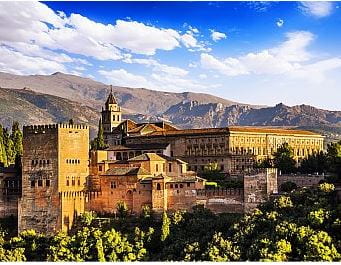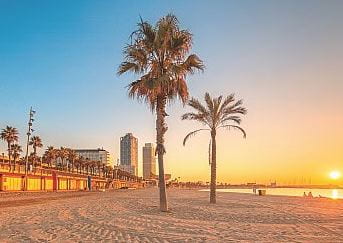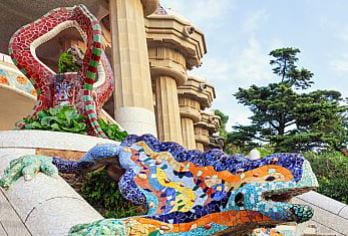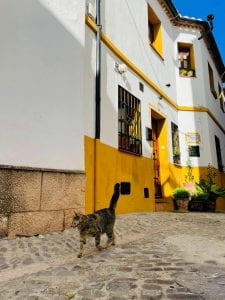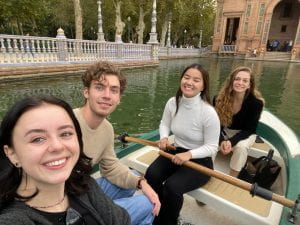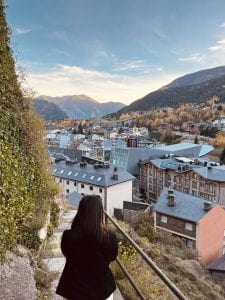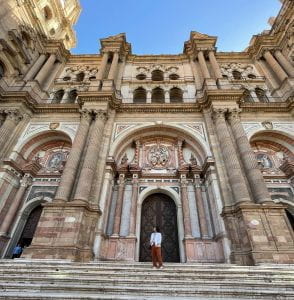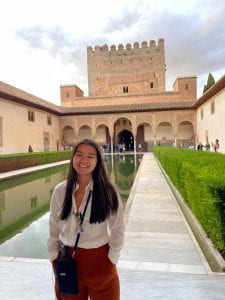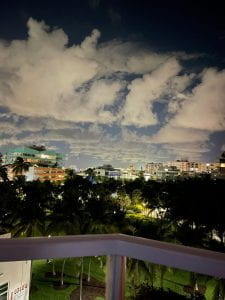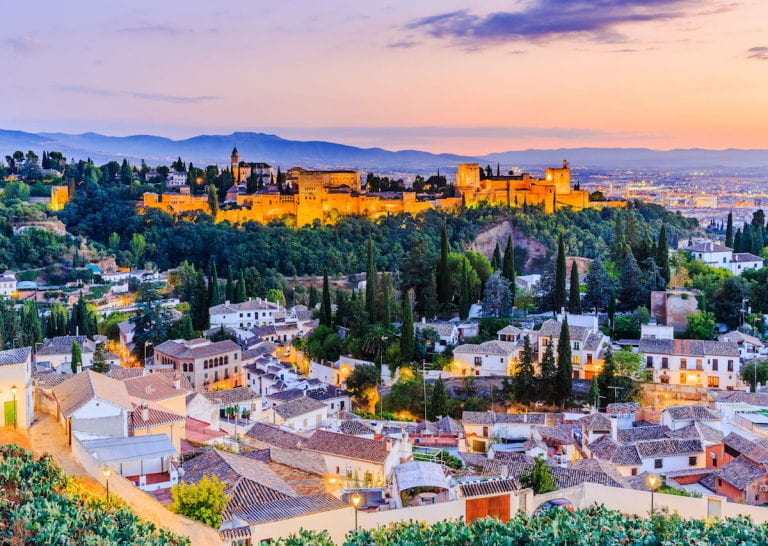Describe the neighborhood where you live, the sights, sounds, and smells and what makes this location unique. Describe a typical day for you or your favorite locations, hot spots, and places for meeting and socializing with new people:
At this point in my time in Barcelona, I can confidently state that I have begun to feel like a true resident of Barcelona. From my participation in the 8 am metro commute, frequent lunches of sandwiches and pastries, and engagement with many of the businesses and people around my apartment I have felt integrated into my city.
My neighborhood is called Garcia and it is in the part of Barcelona that is much older than the common square urban structure of most of Barcelona and boats the beautiful skinny streets that are characteristic of European cities. It sits north of the center of the city/the gothic district but is only a 20-minute metro ride from anywhere you generally would want to go. While walking around these areas you will see many families, couples, teens, and people walking their, often small, dogs. In this area, you can find a number of wonderful bakeries and cafes, each with the staples of Spanish cuisine also adding their own dishes and flare. Also, there are a number of specialty shops like clothing stores, healthy ice cream shops, and also some nicer restaurants scattered about.
This area is generally quieter, but people, including tourists, frequent this area due to the appeal of the skinny streets and general European feel. One of my favorite spots in my neighborhood is the smaller Rambla right next to Garcia, which is lined with trees, markets, and shops and there are not too many people so it’s a nice place to hang out and eat a sandwich or two. Another place I like is the skatepark and surrounding area next to Playa Mar Bella, it is a laid-back atmosphere, and is a great place to skate both in its big flat spaces and because it has a solid skatepark. Parc de Ciutadella is a great spot due to it having that wonderful European feel, ornate statues, cute ponds, great walking, and sitting spaces, and even an extensive zoo with Capybaras! Lastly, I really like the area around the Cathedral of Barcelona in the Gothic quarter, for this is another place with the skinny streets and these are exceptionally beautiful with the cute their planter boxes and intricate architecture and the wonderful little squares with great restaurants, bars, and shops.
From what I have seen some of the main hot spots in Barcelona are the plaza de Catalunya due to its centrality, the club Raz mataz and surrounding area late at night, La Rambla, and Cathedral De Barcelona due to tourists, and of course the foremost playa in Barcelona, Barceloneta, which is also a hub for Spanish seafood cuisine. Right outside my neighborhood are the square streets that make up most of Barcelona and I have found that this area is much louder and busier, cars and motorcycles are loud, many pedestrians walk the street and people fill the cafes with big groups and loud conversation. and this is mostly what I hear when I’m in my room as I am very close to this area. Even though Barcelona is loud it has been nice to not have much sound coming from the other apartment; besides some strong conversation in Spanish sounds, noise is kept to a minimum. As for smells, seeing that Barcelona is a big city, you find that many times the smell of trash, pee and other unpleasantries fill your nose but also at the same time, the smell of pastries, and the Mediterranean air overcome your nose making for a nice balance.
It has been nice to explore the lunch places around my school and home and select the ones that I like best and have become a regular at, which includes a verity of cafes and sandwich shops with wonderful breads and pastries and also a variety of fantastic empanadas, as well as some other types of foods such as Chinese food, Mexican and Indian food. I have found that my linguistic interactions with people at shops, cafes, and restaurants have begun to become increasingly smooth and natural, without my even consciously knowing what I am saying, which is nice! Also, it has been interesting to have longer conversations in Spanish with some of the locals, like at the barber shop and at various restaurants, where you really get to understand someone and the differences of their culture and where you get to share about yourself and your culture back home.
As for my general routine, first, I eat a wonderful fruit-filled breakfast of toast and jam, juice, and a banana, and then get myself ready for the day and then walk to the metro. At the 8:30 am metro every day I see performers in the long metro hall that I have through and then I am met with crowded metro trains of people rushing to school and work. Sometimes I miss the metro but overall, it has still been a reliable and easy mode of transportation. I then go to class in 2-hour sessions and take a break to eat lunch in between classes at one of the cafes, restaurants, or grocery stores and sit in a beautiful nearby park and eat it. Then I go home and after getting coffee and a snack at a cafe, eat dinner with my host mom and hang out then and then typically go out with friends. My friends and I have engaged in a whole matrix of activities. Often, we go to bars to socialize and then later in the night go to one of the many clubs that Barcelona offers, either in the middle of the city or in an area in southeast Barcelona that is notorious for its large clubs. Other nights we might just hang out and talk to people in the program that live near us, we may have a nice dinner at a friend’s apartment, or we might go explore the city or beaches at night.
What has surprised you most about your experience thus far? In looking back at the goals, you set out for yourself at the beginning of your program, tell us how this is going for you?
The most surprising thing for me is how dead the city gets during the afternoon, not only in that there are usually fewer people out but that many shops are closed. The fact that many shops and cafes close during the day was a bummer for me because I tend to have a different eating schedule some days and then I only had a few food options when around 4-6 pm. I was also surprised by how little Catalan I hear here, granted I don’t attempt to speak Catalan to people, but nearly everyone I hear in public is speaking Spanish. A little thing: Lots of younger people smoke cigarettes here and it seems to be less stigmatized than in the US which I find interesting.
Also surprising for me have been some of the classroom dynamics of my classes here. In many of my classes, the students and I have begun to develop a more familiar relationship with the teachers creating a positive and engaging classroom climate. Again, a good amount of the time spent in the classroom has consisted of many debates about certain topics and generally high classroom participation. Teachers definitely encourage and foster this here and they themselves seem to like to engage themselves in these conversations too which makes us accountable for our ideas and encourages us to think before we speak. Being in the middle of the term and the fact that I am taking an extra class, I have been pleasantly surprised by the manageability of the courses and their homework, though frequent group work is very common here.
As for my goals, I believe that I have done well to go out of my comfort zone, engage with the culture and try new things, and I have found a good group of friends to do this stuff with. I have also recently realized that my Spanish-speaking ability has drastically improved. I have begun to notice my Spanish becoming much more automatic, conversations being smoother, and my increasing ability to talk about complex things, which I have been super happy about. I believe I have done a good job at finding out how the people of Barcelona live, both through trying to live it myself, through observation, through events like cooking classes, and through speaking with locals. It has also been wonderful to learn new perspectives on worldly topics like technology, globalization, ethics, and the Spanish language through my classes, and has been very informative considering I am a geography major, so I believe I have already achieved my goal of expanding my academic knowledge as it relates to space and place. And I have been happy that I have been able to travel to Madrid, Tarragona, and La Mancha as one of my goals was to travel outside of Barcelona and experience other cities and regions.
Have you identified strategies or aspects of your program or host culture that provide a better access and insight into community engagement? Do you have advice for others interested in studying abroad?
First and foremost, I think very important for me was to find a good group of friends to experience Barcelona with; I found mine through my study abroad programs. This helps you get out there and be exposed to new things because people you hang out with always want to have fun and do Barcelonan activities and it gives you good people to do it with. One thing that my group and I have done multiple times is go to the FC Barcelona futbol games which gave us access to the exciting culture of Spanish futbol. I have also found that this also makes meeting locals more natural and fun. As for the study abroad programs, I think it is also important to do all the activities that they offer because I found that our trips to Tarragona, Madrid, and our tapas cooking class have been very enjoyable, interesting, and informative of Spanish culture, as they often include lots of information about history and culture.
Other things that have helped me meet a lot of people have been engaging in typical Spanish extracurricular activities, namely for me, playing soccer for my API abroad team. It has been a lot of fun and has exposed me to Spanish soccer and the culture therein, and through this, I have met a bunch of great friends.
I think it is important to do the best you can to try new foods and shops that you would not see or go to in the US. This has helped me to branch out in terms of what restaurants, grocery stores, and general stores I go to, like that of buying weird clothing from strange-looking thrift shops in the gothic district. It is also important to not only try new things but switch it up even if you find something new that you really like because I found myself going to certain cafes too much and then forced myself to try new ones and I believe the diversity has been beneficial.
Other things that have been helpful are just initiating conversation with locals. This is best when it’s in Spanish because it will help you grow your Spanish-speaking skills, but these conversations can also be in English, as many people you will meet will speak English, but good conversation can happen there too. In this vein, one thing I have noticed is that sometimes you will have conversations where you speak Spanish and they will respond in English, and I think this is both due to the fact that they like to practice their English and they know it is harder for you to listen to Spanish and understand it then speak it, so if that happens just go with it.
While I’ve been here it has also been increasingly informative and enjoyable to talk with my host mom about the city and life in general as she has vast cultural and experiential knowledge of activities and celebrations things like la Merced, Halloween, Dia de Los Santos, and bigger worldwide holidays like Christmas, and just general things that are common in Barcelona and the rest of Spain. Also, it has been very beneficial for me to watch Spanish shows, movies, and news programs on the TV, something which my host mom and I do every time we eat together.
